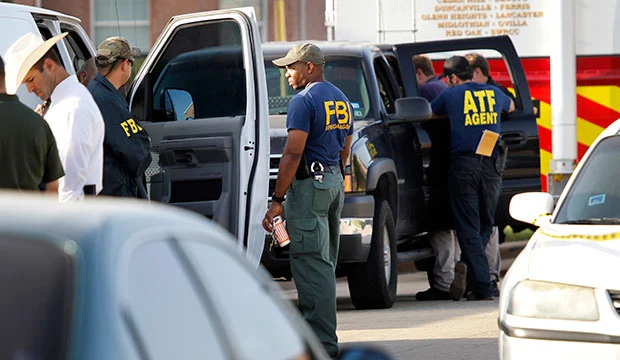FBI Seizures and Forfeitures
In civil asset forfeiture cases, the FBI might seize U.S. currency, cryptocurrency, Cashiers’ checks, money orders, gold or other precious metals, bank accounts, vehicles, vessels, or aircraft. Earlier this year, the FBI, DEA, and U.S. Postal Service recently raided safety deposit boxes at U.S. Private Vaults in Beverly Hills, CA. The FBI even set up an online contact form at https://forms.fbi.gov/u-s-private-vaults-claim-form. After the FBI seizes money or other assets, the FBI should immediately provide a receipt. The receipt is usually written on Form FD-597.
Within 60 days of the seizure, the FBI must send a personal notice explaining why the property was seized for forfeiture, the specific violation of federal law is alleged, an explanation of how to file a verified complaint, and the deadline to file the claim. In civil asset forfeiture cases, the personal notice also explains how to file a petition for remission or mitigation with an offer in compromise, although these types of administrative proceedings rarely work. The better course of action is to file a verified claim for court action before the deadline. Filing the verified claim is the ONLY way to contest the legality of the initial detention or seizure. Suppose you don’t file a verified claim. In that case, you are essentially stipulating to the legality of the seizure and the FBI’s right to take the property in the civil asset forfeiture proceedings.
The FBI rarely grants any petition for remission or mitigation. Most petitions are ultimately denied with a form letter after a long delay. The government only considers granting a petition for remission or mitigation, under limited circumstances, to pardon all or part of the property from the forfeiture. Instead of letting the FBI decide what happens with the money or other seized property, hire experienced civil asset forfeiture attorney Sebastian Rucci to file a verified claim for court action. Filing the claim triggers a 90-day deadline for the Assistant United States Attorney (AUSA) to either return the money or file a complaint for forfeiture in the U.S. District Court.
Civil asset forfeiture is state-sanctioned robbery and is the great injustice of our time.
Filing a Claim after an FBI Seizure
Forfeiture attorney Sebastian Rucci can help you contest the forfeiture of the property seized by the FBI. The claim can be filed immediately after the seizure or within the time period listed in your personal notice letter from the FBI. In some cases, your verified claim can be filed within 30 days after the date of the final publication of the notice of seizure, but only if you never received the personal notice letter.
The verified claim is filed with the Forfeiture Paralegal Specialist of the nearest FBI Field Office. Your attorney will help you file the claim, describe the seized property, explain your ownership or other interest in the property, and list your Asset ID Number. The claim must be made under oath that is subject to the penalty of perjury or otherwise, meets the requirements of an unsworn statement under penalty of perjury as provided in 18 U.S.C. § 983(a)(2)(C) and 28 U.S.C. § 1746.
If the FBI seized your U.S. Currency at the airport, then contact attorney Sebastian Rucci about the best way to get the money back quickly. We can help you file the verified claim. If the seizure created a hardship, we can demand the release of the seized property during the pendency of forfeiture proceedings under the specific conditions explained in 18 U.S.C. § 983(f). Call 330-720-0398.
Requirements of a Claim for Property Seized by the FBI
The laws and procedures applicable to the forfeiture process are found at 19 U.S.C. §§ 1602 – 1619, 18 U.S.C. § 983, and 28 C.F.R. Parts 8 and 9. The forfeiture authority listed in the FBI’s letter often references 18 U.S.C. § 981(a)(1)(C) which prohibits “specified unlawful activity” including drug crimes, money laundering, or fraud.

When submitting a verified claim for court action, the paperwork must be submitted to the local FBI Field Office and to the attention of the Forfeiture Paralegal Specialist. The FBI field office locations and telephone numbers can be found at www.fbi.gov/contact-us/field. The submitting documentation should reference the Asset ID Number.
When claiming a hardship because of the FBI seizure of property, the claimant must establish the following: the possessory interest in the property; the claimant’s sufficient ties to the community to assure that the property will be available at the time of trial; and a showing that the government’s continued possession will cause substantial hardship to the claimant. The hardship provisions are found in 18 U.S.C. § 983(f) and 28 C.F.R. § 8.15. Some types of assets are not eligible for hardship release.
Civil asset forfeiture is state-sanctioned robbery and is the great injustice of our time.
Attorney Sebastian Rucci Focuses His Law Practice on Seizures and Asset Forfeitures
Forfeiture Attorney Sebastian Rucci has 27 years of legal experience and FOCUSES HIS PRACTICE ON SEIZURES AND ASSET FORFEITURES. He also works with other attorneys co-counsel on civil asset forfeiture cases.
Forfeiture attorney Sebastian Rucci will challenge federal asset forfeiture cases throughout the United States. He can file a verified claim for the seized assets, an answer challenging the allegations in the verified forfeiture complaint, seek an adversarial preliminary hearing if one was denied, and challenge the seizure by filing a motion to suppress and dismiss on multiple procedural grounds demanding the immediate return of the seized assets.
seized assets, an answer challenging the allegations in the verified forfeiture complaint, seek an adversarial preliminary hearing if one was denied, and challenge the seizure by filing a motion to suppress and dismiss on multiple procedural grounds demanding the immediate return of the seized assets.
Forfeiture attorney Sebastian Rucci can show that the seized assets are not the proceeds of criminal activity and that the agency did not have probable cause to seize the funds or other assets. Even if a showing of probable cause has been made, he can file to rebut the probable cause by demonstrating that the forfeiture statute was not violated, that the agency failed to trace the funds, or showing an affirmative defense that entitles the immediate return of the seized assets.
Forfeiture attorney Sebastian Rucci is available as co-counsel, working with other counsel, where he focuses on challenging the asset forfeiture and seizure aspect of the case throughout the United States. Forfeiture attorney Sebastian Rucci often takes civil asset forfeiture cases on a contingency fee basis, which means that you pay nothing until the money or other asset is returned. Let experienced forfeiture attorney Sebastian Rucci put his experience with federal seizures and forfeiture actions to work for you, call attorney Sebastian Rucci at 330-720-0398.


